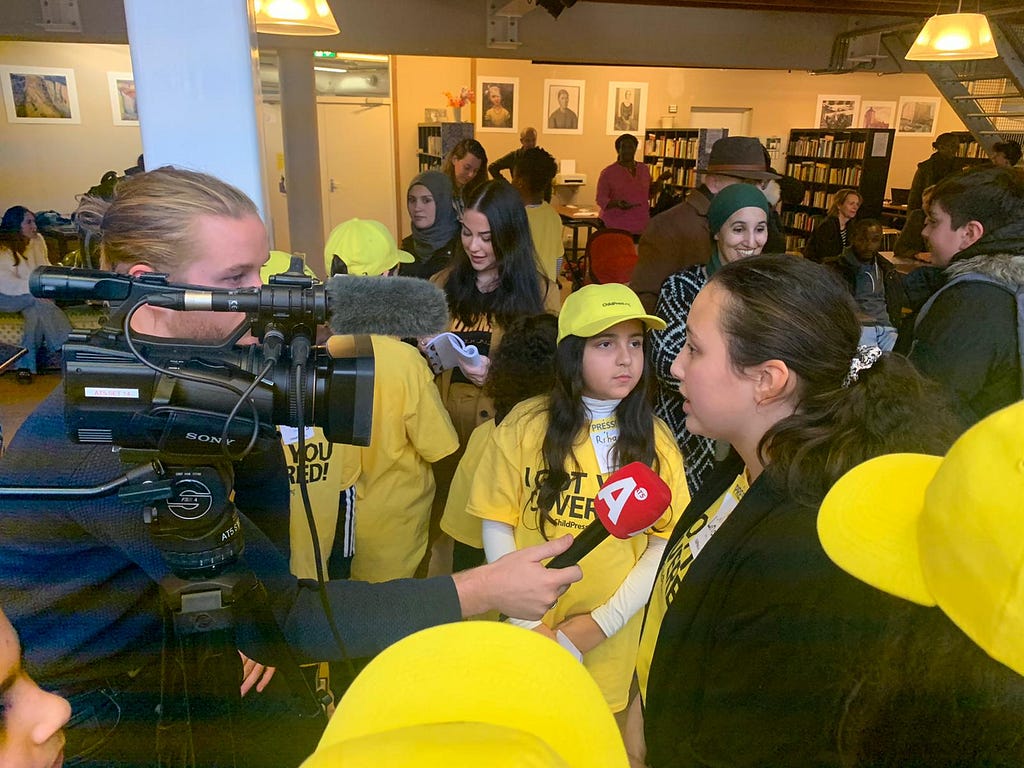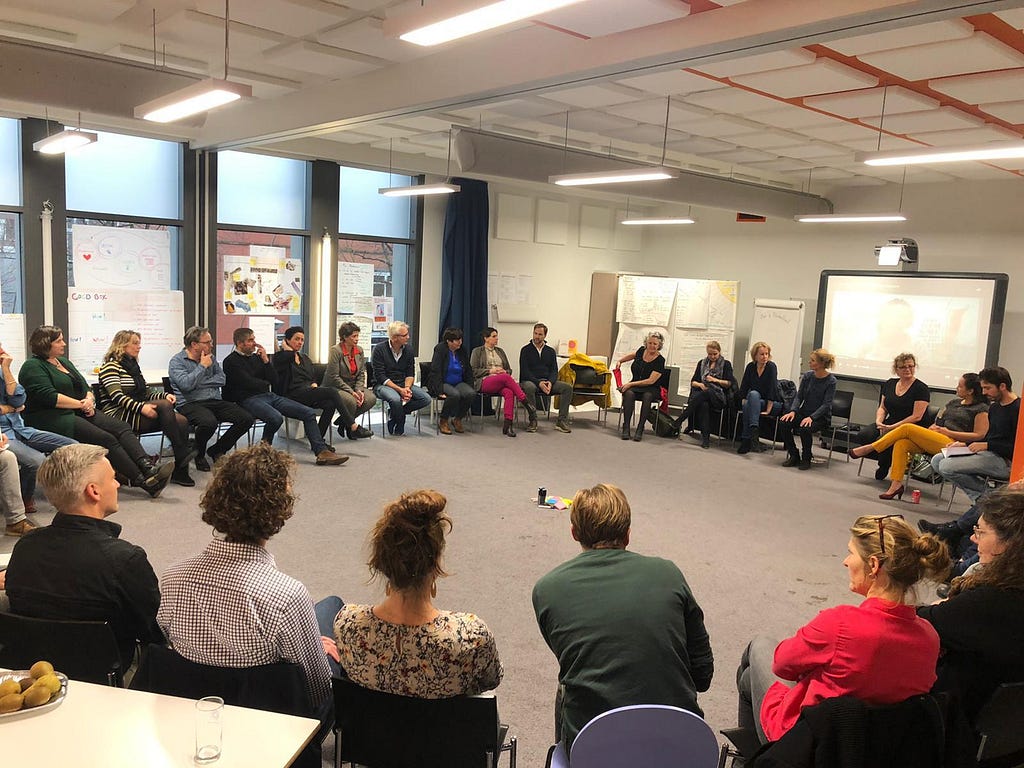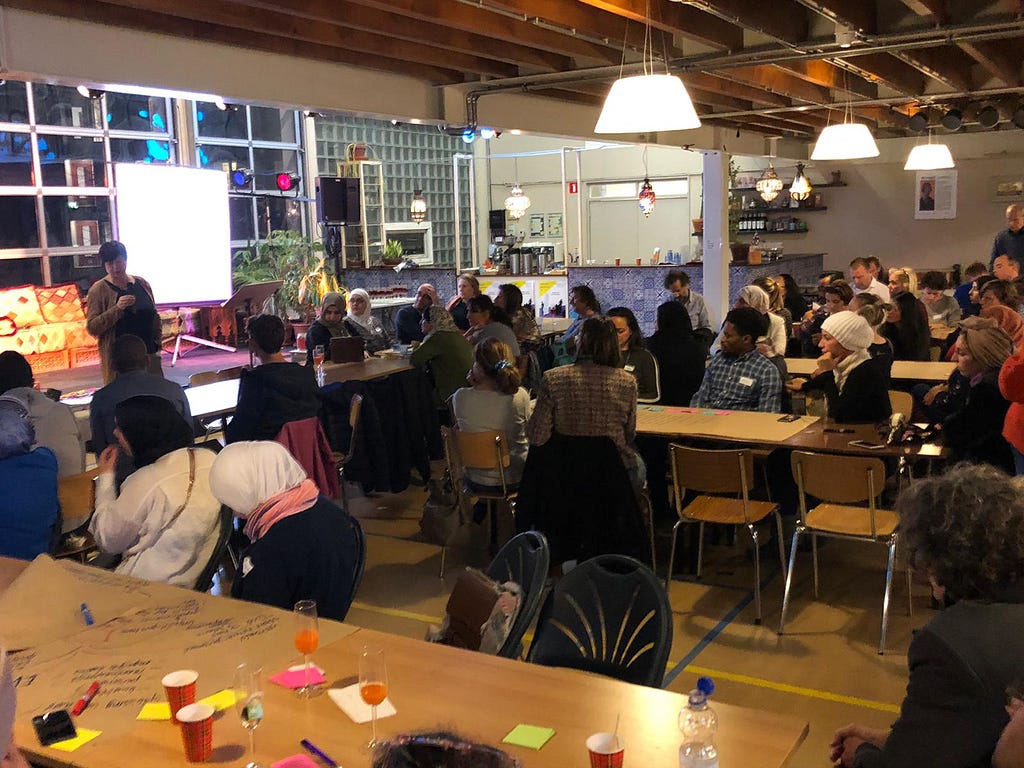article by Simoon Fransen & Joke Middelbeek
The African saying “it takes a village to raise a child” acquires a new meaning for us: “it takes a community to raise a child”. But the reverse is also true: it takes a child to raise a community.

The system crisis in primary education
Against the background of a system crisis in primary education in the Netherlands — involving a vicious circle of teacher shortages, high workloads and low salaries, which GroenLinks MP Lisa Westerveld has described as “a miserable situation for the teachers, parents and students” — the “Quality of Education Week” took place between the 9th and 13th December 2019 at sixteen primary schools in Amsterdam’s Nieuw-West (Western Garden Cities) neighbourhood.
To the astonishment of all those involved, an enormous amount of energy was released during the course of these five days: teachers regained strength despite the fatigue caused by the teacher shortage in the preceding months. Parents grew increasingly enthusiastic during the thinking sessions that revolved around the question of how to maintain and increase the quality of education for their children. No attention was wasted by focusing on complaints about how bad things are: instead, the community engaged fully in brainstorming creatively about possible, practical and workable solutions. Over five hundred teachers, sixteen people from management, and all educational supporters worked collaboratively to develop new plans for primary education at the schools of the Western Garden Cities Foundation (STWT).
The STWT board organised guidance for the schools, and total of fourteen facilitators were active in the process, whereby each of the sixteen schools designed their own process, sometimes working together, at other times working separately. The idea behind this meta-level collaboration — with daily after-action reviews, sessions together, and coaching on location — was also to support and inspire each other, to encourage a stretch in the level of ‘innovativeness’ and finally, to garner a great mix of different ideas, food for prototypes, and new collaborations. All the facilitators were connected through the use of Theory U, aligned their processes, and were supported in that meta-level process by Simoon Fransen. The objective was that each school would still have their own ideas and outcomes, but also align in harmony with the bigger picture, i.e. the whole organization.

The 5,400 pupils or so had no regular education this week, but for them the community (of which the schools are a part) had organized a special programme: for every day of the week, more than 1,000 students were able to get involved in a very varied program, with activities ranging from technology, to drama, to yoga, to chess lessons. A children’s press agency even came together to report on the Week of Education Quality.
https://medium.com/media/35b0682afd1deae3c81f7a5d814cbf24/href
Parents
Parents met during an inaugural dinner on the Monday evening. They supported the teachers, the directors, and the Board in a large majority. They also got actively involved in the programme for the students and brainstormed ideas on how to maintain the quality of education, despite the shortage of teachers. They concentrated on the numerous pre-conditions that play a role in teacher shortage: housing, transport, and even their potential personal role in creating the situation. They suggested greater active parental involvement in the educational process, with the following guiding question: “Do I have something to offer that can help with the learning process?” This could be: scheduling, help with IT, or accounting. In short: the parents emphatically feel part of the community around their schools, but also want to help think outside the box of the current educational system. What about the suggestion to organize one “WOK day” per month? Parents “run” the school for a day, so that teachers can dedicate time and attention to maintaining the quality of education. It was interesting and heart-warming to see how parents feel responsible and actually want to help with coming up with and implementing solutions.

Schools as part of their environment: communities
This is how a movement started at the schools that week in December, and a new connection was made between the schools and Amsterdam Nieuw-West. STWT believes that the connection between parents, the neighbourhood, and the city is crucial for the quality of education. During the Week of Education Quality, many new contacts were established with organisations. Parents became more aware that primary education also affects them directly and that they can play an active role in it. Now the next step will be to make these connections more sustainable in order to be able to offer permanently interconnected education going forward.
The schools worked hard on plans and ideas to improve the quality of education. First of all, there was room and attention for the teams that have worked under high pressure for so long. Each of the teams went back to the intention of education in their own way. From there, they worked on plans for the long, medium, and short term with Theory U as the underlying framework.
School as a breeding ground for learning and development
The school thus becomes a breeding ground for every child to learn and develop. The teachers are involved in the core tasks: language, reading, writing and arithmetic. Everything around it becomes part of the community. In each community available options are investigated in order to allow the other learning and development initiatives to function optimally. Talent development, world orientation and citizenship teaching are themes the children learn about through practical community interaction. The schools ensure the quality of learning and safety of the children. Learning and development are no longer restricted to time and place.
This means that there will not be one model for the future of primary education. During the Quality of Education Week, each school looked at how the relevant community can help shape the curriculum. The ideas on this have found varied expressions. One school is thinking of a four-day week with a community day on day five. Another school believes in an equal relationship between subject specialists and teachers. Yet another school puts the emphasis on the integration between teacher education and community education, evenly spread throughout the day, while taking into account the children’s biorhythm. The wealth of the community is an important factor here. In Amsterdam Nieuw-West, therefore, there will be 16 “breeding grounds” for high-quality educational development.

WOK week: part of a more comprehensive process
The Quality of Education Week is part of a larger process. It started two years ago with “Director’s Days” about the intention of education. Ideas had already started to be created in that direction, but the teacher shortage catalysed the situation before a new policy plan could be mustered. The discussion that arose in November around the national strike for educators was not in alignment with these perspectives. The shortage of teachers increased very quickly, ultimately leading to an emergency-based decision to organise an Education Quality Week.
As a result of having appealed directly to the community, the latter have stepped up and shown that they are there for the children. They are standing behind us. Perhaps the children learned more in that process than we as an educational institution could have offered in that week. In any case, that now happened in a different way. A way in which we see a future by connecting other parties in the neighbourhoods to us in a more sustainable way, a way that fits into the 21st century knowledge economy. New regulatory pressure would only slow this down.
Process
Primary education leads to secondary education. The transition with communities will be “more organic”, because the involvement of the community does not end when the children are 12 years old.
The short term
We have already started. We have entered into discussions with members of the community who have now risen to the occasion with us. We are entering into lasting relationships with them. In addition, we identify what the community has to offer. We are maintaining the flow of change that we have now initiated. Subject teachers will be needed to supplement what the community has to offer.
A new educational system
A re-organisation of education, connected to the community, also offers opportunities to reduce the teacher shortage in a different way. People who are currently on sick leave because they fell outside the boat of the old system would now have a chance to have a meaningful place in such a new educational system.
In our new system there would be more room for other functions than in traditional primary education. We would remove the pressure from the teachers, creating room to resume training teachers within the schools and to build the communities. In addition, there is more room for support staff in the new system, such as timetablers and bridge officials. In part, it concerns new positions for which no training exists, as this can happen on the job.
The transition to the new system would not happen automatically. This requires structural (financial) resources and there must be room for new positions. These development costs cannot be estimated at this time. STWT wants to start a pilot for this and requests a breeding ground budget for this. In addition, perseverance is needed to establish the necessary connections. These connections will be anchored in agreements with the social partners. It is not yet clear how large the requested budget will be. But it will be an investment that pays off socially in the long term. The African saying “it takes a village to raise a child” acquires a new meaning for us: “it takes a community to raise a child”. But the reverse is also true: it takes a child to raise a community.
Joke Middelbeek, director STWT, Amsterdam December 16, 2019
Key message:
The Netherlands — and in particular Amsterdam and the other major cities — is ready for a new education system. A system that is closely connected to the community of which the school is a part. The community consists of the parents of the children and all social organizations that are active in the neighborhood. STWT wants to take the lead in this. We believe that this new system makes the teaching profession much more attractive and gives it more prestige.
The sixteen schools are asking the ministry to set up a breeding ground fund.

January 2020 update
We have entered the new year and everything is still moving forward.
The schools are starting to implement their ‘doable’ solutions and we are thinking of a team with members from different schools to look at the more complex ‘level 4.0’ ideas that need a different process involving the principles of prototyping. Also, press coverage and interest have led to more collaborations and involvement with various external organisations, with whom we are now sharing the Theory U approach. And finally (for now): a new national strike is scheduled for Jan 30-31st, but instead of going out to the streets, schools are copying our approach and preparing for two days of reinventing education with their teams.
article curation: Rachel Hentsch
The “Quality of Education” (WOK) Week in Amsterdam was originally published in Field of the Future Blog on Medium, where people are continuing the conversation by highlighting and responding to this story.
Tagged with :







